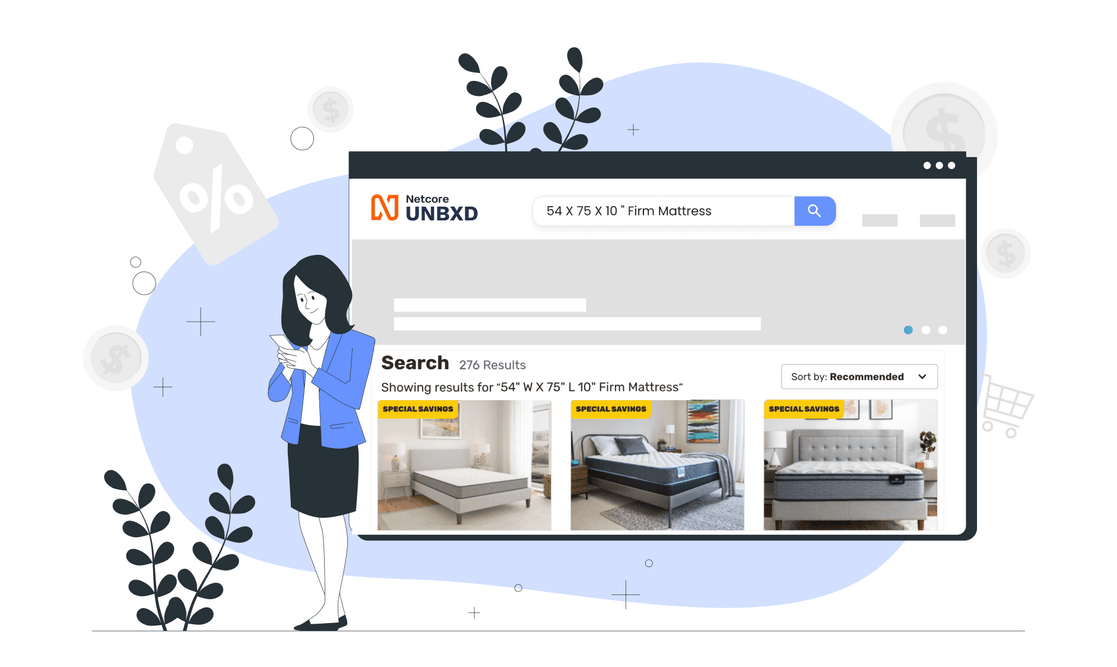- ProductsSearch and BrowseRecommendationsCustomer Engagement
Can your Search handle Measurements?

An increase in internet accessibility has led to a rise in online shopping, especially after the pandemic. Rapid growth in internet usage and the growing online trends led by fashion influencers appeal to Millennials the most. Shoppers get a strong sense of what they want but lose their patience browsing through an extensive collection of products. This means they know the product, desire it strongly, and are on your site to buy it immediately (if they can find it).
Throughout this article, we'll explore how search engines can display accurate results based on measurements used during searches. As you read, keep in mind that when a shopper is typing a search query with a measurement attribute, the intent is always high. And that retailers have to do very little to make measurement search work for them. More on that below!
Now, do you want your: (a) shoppers to spend more time on your site looking for the product, or (b) do you want to speed up their purchase journey through effective site search?
If you stick with the first choice (a), there is a high chance that you will lose your customer. Making them spend more time finding the product will likely overwhelm your shopper and lead to site exits (bounce rates). This means you do not need to make shoppers stay longer on your site to make a purchase; you can focus on improving the quality of the search results.
Let’s look at the second case (b); when searching for products, it is estimated that 71%of sites expect shoppers to use the exact keywords that the site indexes in the catalog. As an example, let's take the same use case. Despite your catalog only containing the symbol “$,” will your search show results for a query that includes the word “USD,” for example, “Pants below 200 USD”?
What is Measurement Search?
The term Measurement Search, a.k.a. Dimension Search, refers to a search query in which shoppers use alphanumeric inputs in search queries. We are looking for a product that includes any units of measurement. For example:
-
Laptops below 500 $ or 500 USD
-
Coin case covers 30 mm or 300 cm
-
Television 45 inches or 45"
-
Mattress king size 78 inches in length
-
Mattress 72706 in or 72706 inches
-
Screen cover 300 mm or 11.8 inches
-
Refrigerator 400l or 400lts
Understanding Measurement Search is easier with these terms
-
Measurement unit normalization converts any given measurement unit into a standard unit. So, for example, if the measurement unit is Pound in the catalog and the user searches in kilograms, the unit will automatically convert to Pounds.
-
Measurement symbol normalization converts a dimension symbol into its normal state. For example, the symbol " is changed to inches, or in, and cms are changed to cm or centimeter.
-
Multi-dimensional search enables searching for products in 2-dimension. Like, 54 inches (Width) x 75 inches (Length) can be entered as a query, yet the result will be relevant. This is valid for all 2D and 3D search queries.
-
Range search facilitates searching within a range, i.e., Firm Mattress less than 12 inches means 0-12 inches mattresses.
-
User-defined tolerance levels aim to allow search queries to have a range of relaxation to bring up a relevant list of results. For example, if you search for a 45-inch television, but the retailer does not carry it, the result set will highlight the matches closest to the search query. Let's say 42-inch televisions in this case. We recommend setting a tolerance level of 10%.
-
With Round-off, you will get the nearest whole number for a search query that contains a decimal. For example, a 10.2 inches firm mattress would be changed to a 10 inches firm mattress. This brings about numeric precision to such filter-based search queries.
Taking a look at a few examples will help


All of the above is only possible when the power of AI, i.e., Named Entity Recognition (NER), comes into play. Measurement Search is an extension of NER. NER is an AI model that uses Natural Language Processing (NLP) to analyze and understand human intent. By breaking down each query, the NER AI model understands the shopper's intent and displays the most relevant products and services. The numerical inputs used by shoppers identify as separate entities. The following are some of the entities identified in the Measurement Search:
Why is Measurement Search important?

Measurement search offers several benefits:
-
This is an enhanced and intelligent ecommerce site search feature for the next generation. Only a few ecommerce retailers have been able to use AI NER in this way. Not even all Site Search providers know this secret. Shhh!
-
It helps you boost or filter products based on user intent. For example, suppose a shopper is searching for a 7 kg washing machine while you have only 7.5 kg machines in stock. The 7.5 kg washing machines will be boosted, followed by 6.5 kg and 8.5 kg washing machines. This falls under Range Searches.
-
Taking the example above, the idea is to reduce zero results pages. This is yet another advantage of Measurement Search.
-
It provides a more relevant shopping experience. Since it matches the queries accurately with the product descriptions, personalized results are displayed.
-
Giving many options, especially an irrelevant list of products, will decrease dwell time and cause many dissatisfactory sites exits. Therefore, Measurement Search helps you reduce bounce rates.
-
Delivering a long list of relevant results also gives an overwhelming feeling which may lead to exiting the site. Easy product discovery is the key to a satisfactory and happy shopping experience.
-
Every ecommerce business wants to provide a memorable shopping experience. Measurement Search can help you achieve that. There are higher chances of return visits if a shopper finds the product they came onto your site for within the first few seconds. They have the intent; they found the product and are probably exploring options.
What happens if your cearch is not measurement-friendly?
If your Search cannot handle measurements, you will face many problems. Let us walk you through it.
What do you need to do to implement Measurement Search?

Absolutely nothing!
You do not need to do anything at all. Upload the catalog, and an advanced AI will do the job. Let us take a look at how we do it at Unbxd.
Every ecommerce retailer has a structured, partially structured, or unstructured catalog. There is information in all of them in some form. There are different properties/attributes associated with each product—for example, size, weight, capacity, etc. Every vertical has a different set of products with different attributes. Some attributes, like the product category, brand, color, etc., can be common to most products.
Only a few of these attributes make it into the catalog, while the rest of the information is stored or hidden in the product description. Product descriptions are long paragraphs describing the product's most minor features and properties. It is often dumped in a long, short, or meta description owing to the requirements set by different marketplaces.

Most of the time, these attributes do not make it into the structured catalog present on the product page.
This is where Netcore Unbxd steps in. We derive the information, extract meaningful data, and create virtual attributes. Virtual attributes behave like normal attributes, except they do not appear in the catalog. So no matter the kind of numeric precision your shopper types, Netcore Unbxd can display relevant results based on the information provided. After all, your customers shouldn't have to dig deep into the product description to discover if it's what they're looking for. In cases where people are searching for products with specific dimensions, we know the intent is high, so we help you convert these shoppers into buyers and reduce bounce rates.
Conclusion
Site search with a measurement feature is a powerful tool. If a shopper types in their search query in terms of measurements, it indicates their high intent and leads to higher conversion opportunities. It drives traffic, increases conversions, and, ultimately, increases sales. Therefore, choosing the right site search for your shoppers and the right type for your ecommerce business is critical.
Measurement Search is the next-generation search feature for ecommerce. If your site searches are not up to the mark, shoppers could leave your ecommerce store due to unfulfilled expectations.
So, now that you know more about Measurement Search, you understand that this is a powerful search feature. However, if retailers implement it, generating revenue will become easier.
To witness the live workings of this feature, book a demo with us.


